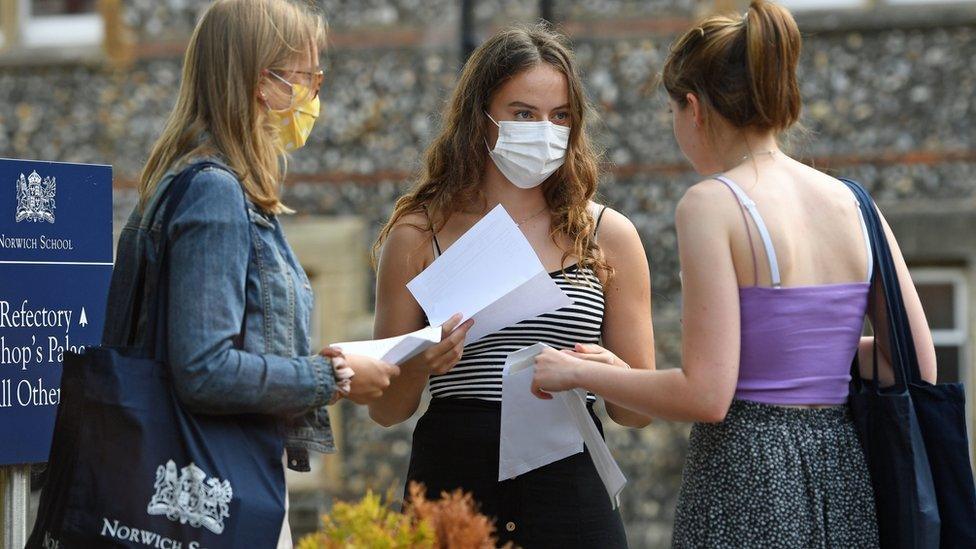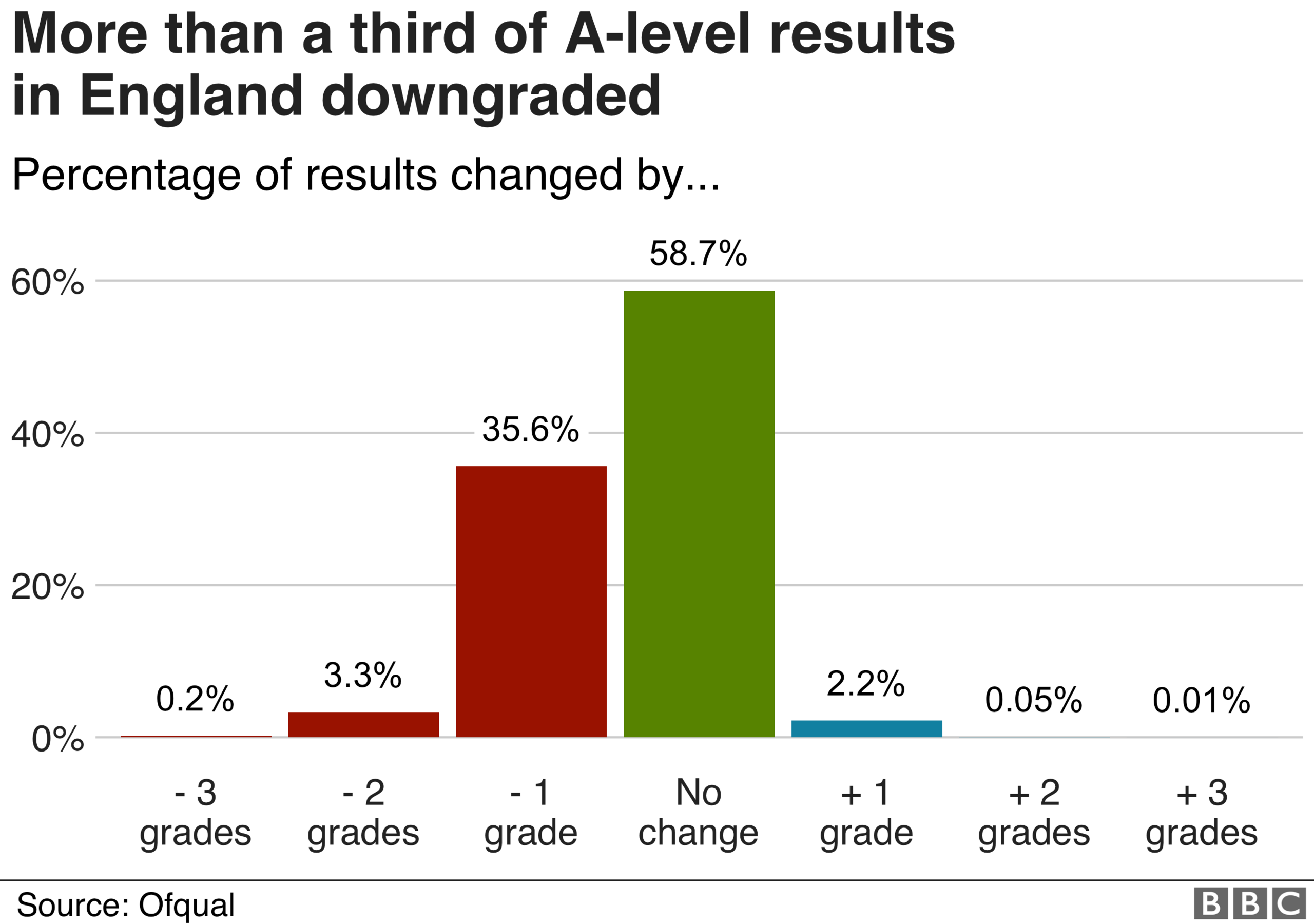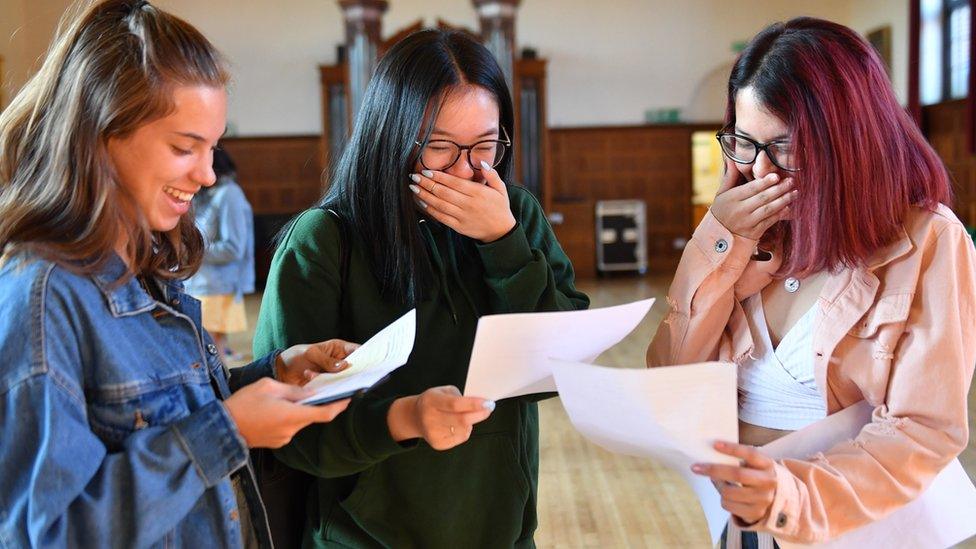A-levels and GCSEs: Free exam appeals for schools in England
- Published

There has been widespread concern about the fairness of the 'calculated' results
The government will cover the cost of schools in England appealing against exam grades after students had 280,000 A-level results downgraded.
Ministers are also expected to set up a taskforce, led by Schools Minister Nick Gibb, to oversee the appeals process.
The government previously said it wants the process to conclude by 7 September.
But letting schools make appeals free of charge is "cold comfort" for pupils, the Liberal Democrats said, adding the move "should never have been needed".
Education Secretary Gavin Williamson told the Times the government would cover the fees in a bid to ensure that head teachers were not deterred from making appeals.
There had been fears that the costs - which can reach £150 - could stop schools from taking on harder to prove cases.
The regulator, Ofqual, will give more details next week.
Nearly 40% of A-level grades awarded on Thursday were lower than teachers' assessments, prompting anger among schools, colleges and students.
'You have ruined my life'
Mr Gibb promised that the appeals system will be "robust" after facing a call during BBC Radio 4's Any Questions on Friday from a student who said she had been rejected by her chosen university.
Nina, from Peterborough, said her grades fell three grades lower than her teachers' estimates. She was expected to achieve ABB and scored As and Bs in her mock exams but was handed three D grades.
She told Mr Gibb she was distraught after failing to meet her offer from the Royal Veterinary College. "You have ruined my life," she told him.
"It won't ruin your life, it will be sorted, I can assure you," Mr Gibb said.
He added: "There will be these mistakes… we do know there are imperfections somewhere in the system as a result of this model. There are no models that can improve on that, this is the problem."
Samantha Smith, a grammar school student from Telford, told BBC Radio 4's Today programme that her results had been downgraded from As and A* grades to a B, E and U.
"I know I didn't sit the exam but I didn't think I'd be treated as if I didn't turn up for the exam," she said.
"I've now got no university places, because of the algorithm and the system of being treated as if your postcode matters more than your potential."


While many students discovered they lost their university places, Oxford's Worcester College said it will honour all offers it made to UK students, irrespective of their A-level results.
Admissions tutor Prof Laura Ashe said it was "the morally right thing to do".
Because students had not taken any exams, "we took the view there wasn't going to be any new information that could justify rejecting someone to whom we'd made an offer", she said.
She said the algorithm used to adjust grades "literally copied the inequalities that are currently existing in our education system", with a quarter of the college's state school applicants being downgraded, but only 10% of private school candidates.
Ofqual adjusted the results to make the spread of grades look right at a national level, she said, but "they can't possibly tell us that they've given the right grades to the right people".
'Cold comfort'
The Liberal Democrats welcomed the announcement over appeals costs, but called on Mr Williamson to resign.
The party's education spokeswoman, Layla Moran, said: "For the young people who have worked so hard to not get the results they deserve, through no fault of their own, this announcement alone will be cold comfort."
"While this should never have been needed, it is right the government has listened to the Liberal Democrats and others and U-turned."
Ms Moran added: "Ultimately, after Gavin Williamson's botched handling of the process thus far, pupils will have no confidence in him to fix the broken glass. Before he causes any more hurt, he must go."
Earlier, Labour called on ministers to act immediately to sort out an "exams fiasco" in England and stop thousands of A-level students being "betrayed".
And some Tory MPs have challenged the fairness of how grades have been decided.
BBC News political correspondent Helen Catt said having "an efficient and effective" appeals process "is going to be really important in making sure more Tories don't join them".


After exams were cancelled due to the coronavirus pandemic, grades were awarded using a controversial modelling system, with the key factors being the ranking order of pupils and the previous exam results of schools and colleges.
This produced more top grades than have ever been seen before in A-levels, with almost 28% getting A* and As, but head teachers have been angry about "unfathomable" individual injustices in the downgrading of some results.
In England, 36% of entries had grades lower than their teachers predicted and 3% were down two grades.
There has since been calls to switch away from this system and to use teachers' predictions, in the way that the government U-turned in Scotland.
But England's exam watchdog Ofqual has warned that using teachers' predictions would have artificially inflated results - and would have seen about 38% of entries getting A*s and As.
Labour said the lack of consistency in individual results was "heartbreaking" for those affected and the government was squarely to blame for sticking with a "fatally flawed results system".
Prime Minister Boris Johnson has previously defended what he said were a "robust set" of grades and said that pupils who believed they were treated unfairly would be able to appeal or, if they wanted, sit exams in the autumn.
Schools can appeal for an upgrade if their pupils' mock grades were higher than their estimated results.
But the exam regulator Ofqual has still to say how a mock exam result can be validated - and head teachers have warned that mocks are not standardised or taken by all pupils, and could not be used as a fair way of deciding final exam results.
- Published14 August 2020
